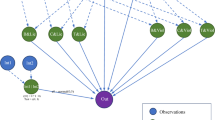Abstract
The religious systems of the “simpler” societies around the world provide us with an opportunity to study their rather deeply engrained habits of thought having to do with the gods and spirits and their relationship to the self, to neighbors, and to family members. These habits of thought have probabilistic relations to the behavior directed toward the self, others, and the authorities representing the supernaturals. We believe that a cross-cultural analysis of the views that people have of the gods and spirits, therefore, can provide us with some insights about beliefs which may justify aggressive or helpful actions and may even reflect the habits of aggressive action insofar as culture helps to determine and maintain such habits.
A much shorter version of this paper was prepared for presentation at the Instanbul meetings of the International Association for Cross-Cultural Psychology, July 1986
Access this chapter
Tax calculation will be finalised at checkout
Purchases are for personal use only
Preview
Unable to display preview. Download preview PDF.
Similar content being viewed by others
References
Aronoff, J., & Crano, W. (1984). Personality and role complexity in the family. Michigan State University, East Lansing.
Barker, R. (1971). Individual motivation and the behavior setting. In W. W. Lambert, & R. Weisbrod (Eds.), Comparative perspectives on social psychology, Boston: Little, Brown.
Barry, H., III. (1957). Relationships between child training and the pictorial arts. Journal of Abnormal and Social Psychology, 54, 380–383.
Bolton, R. (Ed.). (1989). The content of culture: constants and variants: Studies in honor of John M. Roberts. New Haven: HRAF.
Brams, S. (1980). Bible games: a strategic analysis of stories in the Old Testament. Cambridge, MA.: MIT Press.
Colman, A. (1982). Game theory and experimental games. New York: Pergamon.
Ferguson, E. (1983). An investigation of the relationship between the physical organization of religious shrines and the perceived malevolence or benevolence of the gods. Behavior Science Research, 18, 185–194.
Holmberg, A. R. (1969). Nomads of the long bow, the Siriono of eastern Bolivia. Garden City: Natural History Press.
Lambert, W.W., & Tan, A. (1986). Strong strategies in the aggressive actions of children in six cultures. In: R. Bolton (Ed.), The content of culture: constants and variants, New Haven: HRAF.
Lambert, W. W., Triandis, L. M., & Wolf, M. (1959). Some correlates of beliefs in the malevolence and benevolence of supernatural beings: a cross-societal study. Journal of Abnormal and Social Psychology, 58, 162–169.
Minturn, L., & Lambert, W. W. (1961). Sources of frustration and targets of aggression: a cross-cultural study. Journal of Abnormal and Social Psychology, 62, 640–648.
Otterbein, C. S., & Otterbein, K. (1973). Believers and beaters: a case study of supernatural beliefs and child rearing in the Bahama Islands. American Anthropologist, 75, 1670–1681.
Roberts, J. M. (1975). Meaningful god sets from a Chinese personal pantheon and a Hindu personal pantheon. Ethnology, 14, 121–148.
Roberts, J. M., & Sutton-Smith, B. (1962). Child training and game involvement. Ethnology, 1, 166–185.
Rohner, R. P. (1975). They love me, they love me not. New Haven: HRAF.
Triandis, L. M., & Lambert, W. W. (1961). Sources of frustration and targets of aggression: a cross-cultural study. Journal of Abnormal and Social Psychology, 62, 640–648.
Vlastos, G. (1986). Lecture series on Socrates. Ithaca, NY: Cornell University.
Whiting, J. W. M. (1961). Socialization, process and personality. In F. L. K. Hsu, Psychological anthropology. Homewood, II: Dorse
Editor information
Editors and Affiliations
Rights and permissions
Copyright information
© 1992 Springer-Verlag Berlin Heidelberg
About this chapter
Cite this chapter
Lambert, W.W. (1992). Cultural Background to Aggression: Correlates and Consequences of Benevolent and Malevolent Gods and Spirits. In: Fra̧czek, A., Zumkley, H. (eds) Socialization and Aggression. Recent Research in Psychology. Springer, Berlin, Heidelberg. https://doi.org/10.1007/978-3-642-84653-3_14
Download citation
DOI: https://doi.org/10.1007/978-3-642-84653-3_14
Publisher Name: Springer, Berlin, Heidelberg
Print ISBN: 978-3-540-54799-0
Online ISBN: 978-3-642-84653-3
eBook Packages: Springer Book Archive




